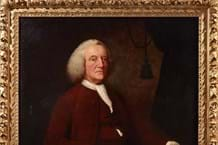Peter Finer, the international arms and armour specialist, is based in Warwickshire and has a shop in St. James’s but does much of his business at the major American fairs. Early next year he stands at the Winter Antiques Show in New York (January 19-28) then moves to the Palm Beach Fair (February 2-11), but he has no intention of adjusting his pricing structure to the prevailing exchange rate.
“I do not change my prices at all,” he told ATG. ”We sell in dollars in America, and before we had the shop in St. James’s we priced everything in dollars.”
He continued: “Most of our pricing is based on the tags we set in October at the start of our American fairs season at the New York International. So our price tags are based on the dollar rate then.
“Of course, if something is extremely expensive and we have a keen deal then I will reach for the calculator and consider it carefully.”
Bond Street’s The Fine Art Society will also be at the Winter Show. “We are a bit nervous, and have to recognise that we might do slightly less business as a result of the currency rates,” managing director Patrick Bourne told ATG. However, he added that the New York market was strong and emphasised the importance of American business that – if not back to where it was pre-9/11 when 48 per cent of The Fine Art Society’s trade was with US buyers – has picked up and stands at 20-25 per cent.
Talking, thinking and pricing in dollars are also the key for Jonathan Horne and Garry Atkins, two English pottery dealers who are stalwart exhibitors at the New York Ceramics Fair (January 17-21). Both feel that it is really purely a psychological question
“I always price in dollars,” said Mr Atkins, “then clients judge the value of the object for what it’s worth without worrying about the exchange rate.”
“You don’t talk about the pound” says Jonathan Horne adding “I tend to price on the lower side”.
Mr Horne also pointed out that a strong pound is not a new phenomenon.
Historically there have been times in the past when the dollar has been even weaker against sterling and it is only in relatively recent times that it has swung the other way.
There are also some advantages to a weak dollar. Buying at two dollars to the pound has sent hundreds of Britons reaching for their passports. Buying antiques or high street goods in the US will now appear better value. Exhibitor fees and the substantial costs incurred when staying in New York or Palm Beach will also fall.
“Your hotel bill will certainly be less,” said Garry Atkins.
Trade weigh up pros and cons of two-dollar pound
Dealers travelling to the United States for the New Year fairs season remained optimistic last week as sterling jumped to its highest level against the dollar in 14 years. The continued weakness in the US currency raised the prospect of a two-dollar pound in time for the January showpiece events in New York and Florida.




